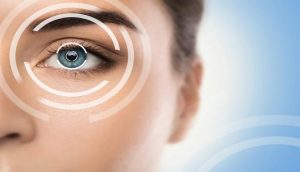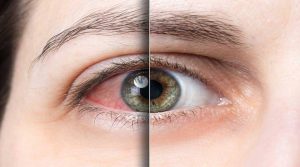Eye sensitivity to light, causes, and treatment methods
Eye sensitivity to light occurs when the eye can not tolerate bright light. Another name for this problem is photophobia. In this article, we have talked about the causes and methods of treating eye sensitivity to light.
Eye sensitivity to light has different intensities and varies from slight sensitivity to light to severe eye disorders. In mild cases of this allergy, you should close your eyes slightly when entering a bright room or bright environment outside the house. In more severe cases, your eyes hurt whenever you are exposed to any light.

Cause of eye sensitivity to light:
There are several reasons for light sensitivity, which are mentioned below:
Eye sensitivity to light and migraine headaches
One of the most common symptoms of migraine headaches is photophobia. Migraine is a severe headache caused by hormonal changes, eating certain foods, anxiety, and environmental changes. Other migraine symptoms include nausea and vomiting.
It is estimated that more than 10% of the world’s population has migraines. Migraine headaches are more common in women than men.
Brain problems caused by diseases
Sometimes the eye’s sensitivity to sunlight or light bulbs is caused by a series of serious diseases that negatively affect the brain. These diseases include the following:
Encephalitis or inflammation of the brain
Encephalitis occurs when the brain becomes swollen due to a viral infection or any other disease. Severe cases of this disease can be life-threatening.
Meningitis
Meningitis is a bacterial infection that causes inflammation of the membranes around the brain or spinal cord. The form of bacterial infection determines the severity of the disease, which includes brain damage, hearing loss, severe seizures, and even death.
Subarachnoid hemorrhage
Subarachnoid hemorrhage is a type of cerebral hemorrhage caused by damage to the brain and surrounding tissue layers. This type of bleeding can sometimes cause death or brain damage, or stroke.
Sensitivity to light due to some diseases
Sensitivity to light is also present in diseases that damage the eyes. These diseases include the following:
Corneal wear
When the eye’s cornea, the outermost layer of the eye, is damaged, it is called a corneal abrasion. This type of damage is common and occurs when sand, dirt, metal particles, and other materials enter your eyes. Scratch infection leads to corneal ulcers.
Scleritis
When part of the whites of the eyes become inflamed, it is called scleritis. About half of people with this eye disease have a weak immune system, such as lupus. Other symptoms of scleritis include pain, watery eyes, and blurred vision.
Conjunctivitis
Conjunctiva, or redness of the eye, is an inflammation of the eye membrane that occurs when a layer of tissue that covers part of the whites of the eye becomes infected or inflamed. This infection or inflammation may be of viral origin but can sometimes be caused by a bacterial infection or allergy. Other symptoms of this eye disease include itchy eyes, redness, and pain in the eyes.

Dry eye syndrome
Dry eye occurs when the lacrimal glands no longer produce tears, or there are very few tears. In this case, the eyes become very dry in the absence of tears. Causes of dry eye include age, environmental factors, certain diseases, and the use of certain medications.
Bright and colorful eyes
People with bright eyes may be more sensitive to light or sunlight than people with dark eyes. Dark eyes have more pigment and protect the eyes from bright light.
Other diseases
Other diseases that cause the eyes to be sensitive to light include:
- Progressive paralysis;
- The possibility of a tumor in the pituitary gland;
- Uveitis (inflammation of the middle layer of the eye);
- Inflammation of the cornea (in this case, the cornea, the clear layer that covers the colored part of the eye, becomes very inflamed);
- Iris inflammation (swelling of the colored ring around the pupil);
- Cataracts (a disease that begins when the lens of the eye becomes blurred);
- Retinal damage (sensitive layer behind the eye);
- Contraction in the eyelid (a problem that causes the eyelids to jump or close involuntarily).
Time to see a doctor:
You should see a doctor when your eye is sensitive to one of the eye diseases. If you have one or more of the following symptoms, take it seriously and be sure to go to a health center:
Symptoms of corneal abrasion
- Blurred vision;
- Pain or burning in the eyes;
- Red eyes;
Symptoms of encephalitis
- severe headache;
- high fever;
- Fatigue;
- Confusion.
Symptoms of meningitis
- Ague;
- severe headache;
- Dry neck;
- nausea and vomiting.
Symptoms of subarachnoid hemorrhage
- Severe and sudden headaches that spread to the back of the head
- Irritability and confusion;
- Decreased consciousness;
- Anesthesia in parts of the body.
Treatment methods for eye sensitivity to light:
With the following treatments, you can solve the problem of photophobia to a large extent:

Home care
Do not expose to sunlight and darken the interior a little. In this way, the sensitivity of the eye to light will not be annoying. Closed eyes or the use of dark sunglasses are also effective in relieving discomfort from light. Of course, sometimes sunglasses are not for everyone. These glasses make people more sensitive to light. So talk to your ophthalmologist about the best way to treat photosensitivity.
Also, when you want to be in strong sunlight, it is better to use polar sunglasses. These types of glasses protect your eyes from the reflection of light from water, sand, snow, concrete roads, and other reflective surfaces more than ordinary sunglasses.
If you are very sensitive to light, you can use synthetic contact lenses. These lenses reduce the amount of light that enters the eye and make your eyes comfortable.
Drug treatments
If you are severely sensitive to light, see your doctor immediately. They will examine your eyes and the sensitivity of your eyes to light to determine the root cause.
An ophthalmologist can diagnose the cause of your photophobia in the following ways:
- Slit-lamp test. An ophthalmologist examines your eyes using a microscope equipped with a light bulb.
- Magnetic resonance imaging (MRI), All the details of your eye are examined using magnetic devices and radio waves.
- Check the tears. This test tests the number of tears you should see if you have dry eye syndrome.
Some medications may include the following, depending on the underlying cause of the eye’s sensitivity to light:
- Medication and rest in migraine conditions
- If you have scleritis, use eye drops to reduce eye inflammation
- Prescribing antibiotics to treat conjunctiva
- Prescribing artificial tears for the treatment of mild dry eye syndrome
- Prescribing antibiotic eye drops to treat corneal wear
- Use of anti-inflammatory drugs, bed rest, and drinking fluids for mild cases of encephalitis (in more severe cases, more care is needed, such as helping the person breathe);
- Prescribing antibiotics to treat bacterial meningitis (the viral type usually goes away on its own after two weeks.
- Surgery to remove excess blood and reduce pressure on the brain in the event of subarachnoid hemorrhage.
Methods to prevent photophobia:
Although eye sensitivity to light can not be eliminated, you can do the following to prevent it:
Avoid triggers that trigger migraine attacks.
For hygiene, do not touch the eyes and use eye cosmetics to protect the conjunctiva.
Keep your distance from people with meningitis, so you do not run the risk of developing the disease. Wash your hands regularly to protect against bacterial meningitis.
Also, prevent encephalitis by washing your hands regularly. Get vaccinated against encephalitis and also stay away from mosquitoes and ticks to avoid getting the disease.
If you are sensitive to light at night or the sun is bothering you, you can use light filter protectors. These types of filters are designed for use with prescription glasses. Filter shields are usually made of several different colors and can reduce the amount of light. Of course, it is better to use this type of light filter protector in consultation with your doctor to suggest the most suitable case.










